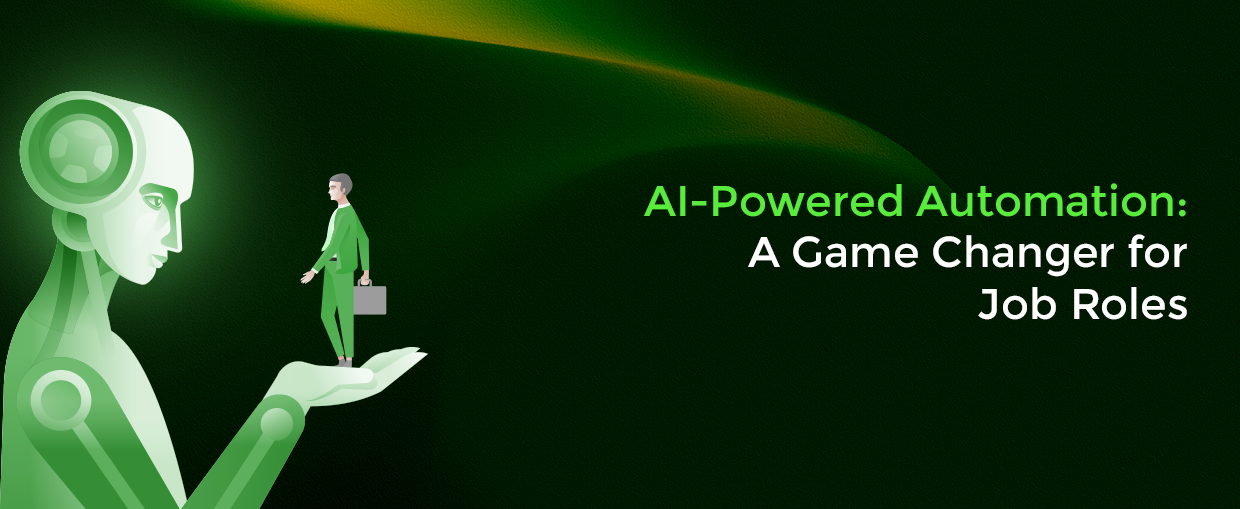The rapid rise of artificial intelligence (AI) and automation is revolutionizing the modern workplace. What was once limited to managing repetitive tasks has now evolved into a force that enhances problem-solving, decision-making, and even creative thinking.
AI automation in job roles is not only about driving operational efficiency but also allowing businesses to reallocate human talent toward more strategic and impactful work. As AI automation in job roles continues to grow, it is reshaping the way organizations function, enabling them to achieve higher levels of innovation and productivity. Let’s look into it in more detail.
How Job Roles in Tech Are Evolving in the Age of AI Automation?
AI and automation are transforming workflows by streamlining processes and handling repetitive tasks. While these innovations boost efficiency, they also necessitate a rethinking of human roles within the workplace. Consequently, traditional job positions are undergoing change, with certain roles fading away and new ones taking shape. The primary sectors where artificial intelligence and automation are making the most substantial impact include:
1. Software Development
AI tools can assist in coding, debugging, and project planning, but custom software development still requires skilled developers. Their expertise remains essential for high-level architecture, innovative problem-solving, and the management of intricate systems.
2. Data Science
Automation is increasingly prevalent in data analysis, yet the contributions of human data scientists are vital for deciphering complex datasets and implementing insights to solve real-world problems.
3. Cybersecurity
Automation plays a significant role in threat detection. Cloud-based machine learning models can help automatically identify potential security threats, reducing the need for constant manual monitoring. Yet the involvement of cybersecurity experts is critical for formulating strategies and addressing advanced attacks.
Essential Skills for Thriving in the AI Age
Standing at the threshold of the AI revolution, there has been a major transformation in the work landscape, which demands an adaptation in the skill sets for achieving success. Let us look into the essential skills that will define the future of work, allowing individuals to approach the challenges of the AI age with both confidence and agility.
Data Literacy
Data literacy is the skill to interpret, analyze, and extract insights from data. Since data drives AI, understanding it is crucial for informed decision-making and maximizing the potential of AI technologies, which rely on accurate datasets to improve.
Critical Thinking
Critical thinking, the ability to analyze information objectively and make sound judgments, remains vital in an era of AI-driven decision-making. As automation increases, strong critical thinking skills are essential for identifying issues and ensuring optimal solutions.
Creativity
Creativity is an inherently human ability that artificial intelligence cannot duplicate, involving aspects such as innovation, ideation, and problem-solving. In the era of AI, nurturing creativity allows individuals to develop original ideas and strategies that promote innovation and set them apart.
Emotional Intelligence
Emotional intelligence (EI) refers to the capacity to understand and control one’s own emotions as well as those of others. With the growing interaction between AI systems and humans, people who possess strong emotional intelligence are well-equipped to develop meaningful relationships and collaborate productively.
Adaptability
Adaptability is the skill to navigate change with ease, embracing new challenges and technologies. In an AI-driven world, it enables quick learning and success in fast-paced, evolving environments.
How to Future-Proof Your Job Roles in the Era of AI Automation?
Tech professionals worried about the effects of AI automation on their job roles can take the following proactive measures to secure long-term job stability:
Continuous Learning
Individuals should prioritize continuous learning and developing skills that support AI technologies, such as data analysis, programming, and critical thinking. It is important to be adept with AI tools like Google’s Gemini, Microsoft’s Co-Pilot, and ChatGPT, along with AI art generators like Midjourney and Dall-E for effective writing and visual content. Organizations must invest in upskilling or reskilling programs to equip employees for an AI-powered future.
Experimentation and Innovation
Identify tasks in your role that involve repetitive actions, large amounts of data, or complex problem-solving that could benefit from automation. These are prime opportunities for AI automation in job roles. Reflect on the potential of AI to uncover entirely new creative avenues and concepts that have not been previously contemplated by quickly examining new permutations.
Experiment with creating AI-driven workflows to optimize and speed up inefficient processes, potentially reducing time spent on routine and mundane tasks.
Collaboration
Promote a collaborative environment where humans and AI work together, utilizing their unique strengths to reach common goals. Promote the formation of interdisciplinary teams that blend industry knowledge with AI skills, fostering innovation and idea exchange. Encourage colleagues, employers, and partners to embrace AI pilot projects and experimentation, rather than resisting progress, and take the lead in driving these initiatives forward.
Ethical Frameworks
Set strong ethical standards for creating and using AI technologies, prioritizing transparency, fairness, and accountability. Foster open conversations and involvement in broader industry debates about ethical AI and the best practices for its responsible implementation.
Adaptability
Embrace technological disruptions as chances for growth, viewing change as a stepping stone rather than a challenge to stability. Foster a culture of curiosity and innovation, encouraging everyone to explore emerging technologies and approaches. AI offers a transformative opportunity for both individuals and organizations to drive change.
Instead of fearing AI as a threat, we should welcome it as a catalyst for creativity, growth, and progress. By adopting AI tools, acquiring new skills, and continuously evolving, we can safeguard our careers and achieve long-term success.
Wrapping Up
The key to thriving in this new era is adopting these transformative technologies, upskilling the workforce, and fostering a collaborative environment where AI and human talent work together for greater outcomes. Future-proof your organization and empower your team for success in the age of automation. Partner with an AI development company offering top-tier artificial intelligence development services. Have any queries? Feel free to contact us!



